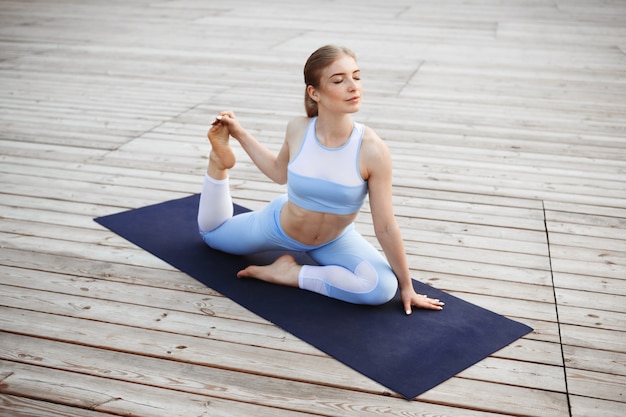
A yoga body isn’t just about flexible limbs; yoga can improve memory, heart, and bone health, according to Anna Magee.
People in the UK are now spending a significant £790 million a year on yoga classes and mats. While yoga trends are becoming quirky with rage yoga, dog yoga, and even yoga on paddleboards, science supports yoga’s numerous benefits. Researchers at UCLA found that a three-month course of yoga and meditation outperformed memory exercises in reducing age-related brain impairment and improving sleep in breast cancer survivors.
When Lucy Edge, a 53-year-old former advertising executive, fell into a severe depression, she chose yoga over prescribed anti-depressants. During a six-month break in India, she didn’t achieve a “yoga goddess” body but returned happier and more content. Lucy has since written three books about yoga and created Yoga Meds, a section on her website listing over 300 clinical trials showing yoga’s benefits for various health issues like arthritis, insomnia, and obesity. Lucy wanted to share yoga’s benefits backed by scientific evidence.
Yoga can improve your memory more effectively than traditional brain exercises, as shown by UCLA research. They studied 25 adults over 55, comparing 12 weeks of memory exercises to yoga and meditation. The latter group saw better improvements in spatial and visual memory, reduced depression and anxiety, and increased stress resilience. Although the study was small, it suggests further research into yoga’s benefits could be valuable for keeping our hearts and brains healthy as we age. In this study, participants practiced one hour of Kundalini yoga weekly, incorporating gentle poses, breathing techniques, meditation, and chanting. They also did 20 minutes of Kirtan Kriya daily, a meditation involving chanting, hand movements, and light visualization.
For heart health, yoga offers a gentler option compared to running or brisk walking. A systematic review in the European Journal of Preventative Cardiology in 2014 demonstrated that yoga could lower heart disease risk as effectively as conventional exercise. Reducing stress through yoga helps lower blood pressure and heart rate, both risk factors for heart disease.
Charlotte Watts, a yoga teacher and author, created a stress-reducing yoga series great for beginners. Restorative yoga, taught by Anna Ashby, involves postures supported by bolsters and cushions, held for up to 12 minutes to reduce stress quickly. Musculoskeletal physiotherapist Sarah Shone developed yoga classes as part of a rehabilitation program for back pain, with 87% of participants reporting less pain. NICE guidelines recommend yoga for lower back pain, and Sarah aims to train more physiotherapists to use yoga clinically, as it targets pelvic floor muscles and increases bone density. Starting with gentle styles like Hatha or Iyengar yoga is advisable, and discussing your condition with a doctor can help you access subsidized yoga sessions.
When choosing a yoga mat, consider where it will be used and its visibility, weight, portability, and thickness, especially if you have joint issues. Healthista recommends the Elephant Cork Yoga mat from Valka Yoga for £69.95, which is eco-friendly, durable, and provides excellent joint support. The mat includes a carry strap and comes with a 15-day money-back guarantee and a one-year replacement warranty.
A matching Elephant Cork Yoga block for £19.95 can aid in achieving difficult poses by providing extra length and stability. While not as lightweight as foam blocks, cork blocks offer better grip and durability.
No matter your flexibility, yoga offers options to suit everyone. Yin or Restorative yoga classes are great for gentle stretching, Vinyasa Flow classes combine breath with movement, and Iyengar yoga focuses on alignment with props. Anusara yoga adds flowing movements and upbeat music, while Yoga Therapy aims to heal specific injuries or illnesses.
Yoga provides numerous benefits for mental and physical health, supported by both personal experiences and scientific research.




